语法(剑桥英语语法词典)DICTIONARYCAMBRIDGE
剑桥英语语法 初级 中级
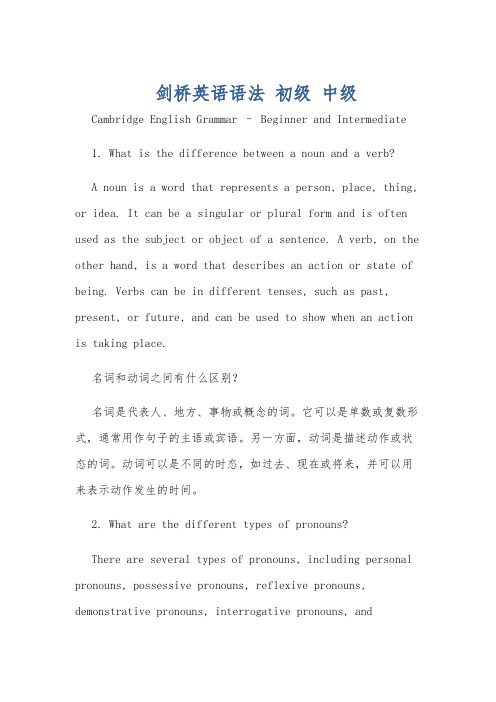
剑桥英语语法初级中级Cambridge English Grammar – Beginner and Intermediate1. What is the difference between a noun and a verb?A noun is a word that represents a person, place, thing, or idea. It can be a singular or plural form and is often used as the subject or object of a sentence. A verb, on the other hand, is a word that describes an action or state of being. Verbs can be in different tenses, such as past, present, or future, and can be used to show when an action is taking place.名词和动词之间有什么区别?名词是代表人、地方、事物或概念的词。
它可以是单数或复数形式,通常用作句子的主语或宾语。
另一方面,动词是描述动作或状态的词。
动词可以是不同的时态,如过去、现在或将来,并可以用来表示动作发生的时间。
2. What are the different types of pronouns?There are several types of pronouns, including personal pronouns, possessive pronouns, reflexive pronouns, demonstrative pronouns, interrogative pronouns, andrelative pronouns. Personal pronouns refer to specific people or things, such as "I," "you," "he," "she," "it," "we," and "they." Possessive pronouns show ownership, such as "mine," "yours," "his," "hers," "ours," and "theirs."不同类型的代词有哪些?代词有几种类型,包括人称代词、所有格代词、反身代词、指示代词、疑问代词和关系代词。
剑桥国际英语语法、词汇、短语、表达全突破
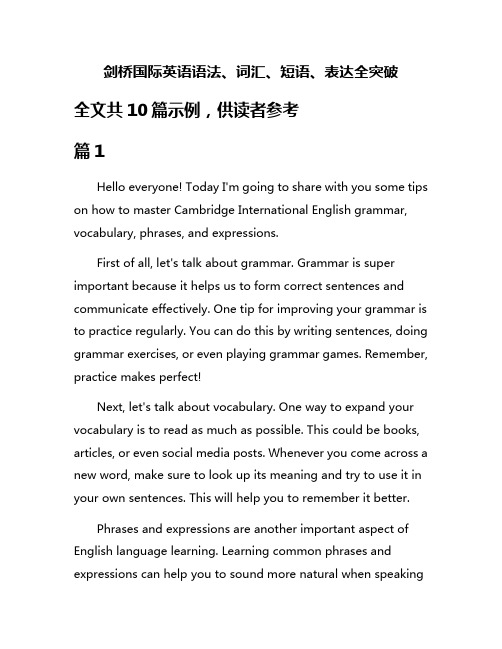
剑桥国际英语语法、词汇、短语、表达全突破全文共10篇示例,供读者参考篇1Hello everyone! Today I'm going to share with you some tips on how to master Cambridge International English grammar, vocabulary, phrases, and expressions.First of all, let's talk about grammar. Grammar is super important because it helps us to form correct sentences and communicate effectively. One tip for improving your grammar is to practice regularly. You can do this by writing sentences, doing grammar exercises, or even playing grammar games. Remember, practice makes perfect!Next, let's talk about vocabulary. One way to expand your vocabulary is to read as much as possible. This could be books, articles, or even social media posts. Whenever you come across a new word, make sure to look up its meaning and try to use it in your own sentences. This will help you to remember it better.Phrases and expressions are another important aspect of English language learning. Learning common phrases and expressions can help you to sound more natural when speakingor writing. You can learn new phrases by listening to native speakers, watching English movies or TV shows, or even by using language learning apps.In conclusion, mastering Cambridge International English grammar, vocabulary, phrases, and expressions may seem like a daunting task, but with regular practice and dedication, you can definitely improve your English language skills. Remember to have fun while learning and don't be afraid to make mistakes –that's how we learn and grow! Keep practicing and you'll soon be a pro at English! Good luck!篇2Hey guys! Today I want to talk about this awesome book called "Cambridge English Grammar, Vocabulary, Phrases, and Expressions Complete Breakthrough". It's super cool and helps you learn English better.First of all, let's talk about grammar. Grammar is like the rules of a language. It helps us put words together in the right way. This book has lots of easy explanations and examples to help us understand grammar better. It's really helpful when we're trying to make sentences that make sense.Next, let's talk about vocabulary. Vocabulary is all the words we know in a language. This book has lots of cool words and phrases to help us expand our vocabulary. It's important to know lots of words so we can express ourselves better when we talk or write.Phrases and expressions are like special groups of words that have a specific meaning. This book has a bunch of common phrases and expressions that we can use in everyday English. It's so cool to learn these because it helps us sound more natural when we speak.Overall, I think this book is amazing for learning English. It's like having a secret weapon to help us improve our language skills. So if you want to be a pro at English, check out "Cambridge English Grammar, Vocabulary, Phrases, and Expressions Complete Breakthrough". It's the best!篇3Hey guys, do you want to learn some cool stuff about English grammar, vocabulary, phrases, and expressions? Well, buckle up because we are going to dive into the world of Cambridge International English!First off, let's talk about grammar. Grammar is like the rules of the English language. You need to know how to use verbs, nouns, adjectives, and all that stuff correctly to make sure your sentences make sense. For example, you need to remember to add 's' to verbs when talking about he, she, or it. So instead of saying "He go to school", you should say "He goes to school".Next up, vocabulary. Vocabulary is all the words you know and use in English. The more words you know, the better you can express yourself. So, try to learn new words every day and use them in your conversations. You can also use flashcards or language learning apps to help you remember new words.Now, let's move on to phrases and expressions. Phrases are groups of words that go together to make a complete thought. Expressions are special phrases that have a different meaning than the individual words. For example, "break a leg" doesn't actually mean break your leg, it means good luck! So, it's important to learn common phrases and expressions to sound more natural when speaking English.In conclusion, learning English grammar, vocabulary, phrases, and expressions is super important if you want to become fluent in the language. So, keep practicing, reading, and speaking English every day to improve your skills. With the help ofCambridge International English resources, you can definitely break through any language barriers and become a pro in no time!That's all for now, folks! Keep shining bright like the stars you are, and remember, practice makes perfect! See you next time!篇4Once upon a time, there was a group of students who were really struggling with their English grammar, vocabulary, phrases, and expressions. They were feeling so lost and confused, not knowing where to start or how to improve. But then one day, they stumbled upon the magical book called "Cambridge International English: Grammar, Vocabulary, Phrases, and Expressions All-in-One Breakthrough."This book was like a treasure trove of knowledge and wisdom, filled with fun and easy-to-understand explanations of grammar rules, interesting vocabulary words, useful phrases, and common expressions. The students were amazed at how quickly they were able to grasp the concepts and apply them in their daily conversations and writing.With the help of this magical book, the students started to feel more confident and proficient in English. They were no longer afraid of making mistakes or getting confused by complex grammar structures. They were able to express themselves more fluently and accurately, impressing their teachers and classmates with their newfound skills.As they continued to study and practice with the book, the students saw great improvements in their English abilities. Their grades started to improve, and they felt more motivated and inspired to keep learning and growing. They even started to dream of studying abroad or working in an English-speaking country someday.Thanks to the "Cambridge International English: Grammar, Vocabulary, Phrases, and Expressions All-in-One Breakthrough," the students were able to achieve their goals and become successful English speakers. They lived happily ever after, knowing that they had unlocked the secret to mastering English and becoming fluent in the language.So if you ever find yourself struggling with English grammar, vocabulary, phrases, and expressions, just remember the magical book that helped these students succeed. Pick up a copy, diveinto the world of English language learning, and watch as your skills soar to new heights. Happy learning!篇5Hello everyone! Today I want to share with you all about the Cambridge International English Grammar, Vocabulary, Phrases, and Expressions. Sounds fancy, right? But don't worry, I'll explain it in a fun and simple way!First, let's talk about English grammar. Grammar is like the rules of a game. It helps us to speak and write correctly. For example, we use verbs to show actions like 'run', 'jump', and 'eat'. We also use adjectives to describe things like 'big', 'happy', and 'blue'. Remember, practice makes perfect when it comes to grammar!Next, let's learn about vocabulary. Vocabulary is like a treasure chest full of words. The more words you know, the better you can express yourself. Try to learn new words every day and use them in sentences to remember them better. Reading books, listening to songs, and watching movies are great ways to improve your vocabulary.Now, let's move on to phrases. Phrases are like building blocks that help us make sentences. Phrases like 'I'm sorry', 'Howare you?', and 'What's your name?' are very commonly used in English. By learning different phrases, you can communicate better with others and make new friends easily.Lastly, let's talk about expressions. Expressions are like special ways to say things. For example, instead of saying 'I'm tired', you can say 'I'm beat'. Isn't that cool? Learning expressions can make your English more interesting and colorful.In conclusion, mastering the Cambridge International English Grammar, Vocabulary, Phrases, and Expressions is important for becoming a fluent English speaker. So keep practicing, keep learning, and most importantly, have fun with English! Thanks for listening, and I hope you found this helpful. Bye for now!篇6Cambridge International English Grammar, Vocabulary, Phrases, and Expressions are like super cool tools that help us speak and write English like a pro! Let's dive into these awesome resources and level up our English game.First up, let's talk about grammar. It's like the building blocks of English. We use grammar rules to make sure our sentences are clear and make sense. For example, we know that we need asubject and a verb in a sentence to express an action or state. So, we say things like "I play soccer" or "She likes ice cream." Without grammar, our sentences would be all jumbled up and confusing!Next, let's chat about vocabulary. Vocabulary is like our word bank. The more words we know, the better we can communicate. With a strong vocabulary, we can express our thoughts and feelings more accurately. Plus, it's super fun to learn new words and impress our friends with our mad vocabulary skills!Now, onto phrases. Phrases are like ready-made chunks of language that we can use in different situations. They help us sound more natural and fluent in English. For example, instead of saying "I am going to the store," we can use the phrase "I'm heading to the store." Phrases make our speech more colorful and interesting!Last but not least, expressions. Expressions are like little sayings or idioms that add flavor to our language. They can be funny, serious, or just plain weird! For example, "It's raining cats and dogs" is a fun expression that means it's raining really hard. Learning expressions is a great way to show off our personality and connect with others.So, there you have it! Cambridge International English Grammar, Vocabulary, Phrases, and Expressions are the keys to unlocking our full potential in English. Let's dive in, have fun learning, and become English superstars!篇7Hello everyone! Today I'm gonna tell you all about how to master Cambridge International English Grammar, Vocabulary, Phrases and Expressions. It might sound like a mouthful, but trust me, it's not as hard as it seems!First things first, let's talk about English grammar. It might seem boring, but it's super important if you want to speak English like a pro. You need to know all about tenses, articles, prepositions, and much more. Don't worry if you don't get it right away, practice makes perfect!Next up, we have vocabulary. This is all about learning new words and how to use them in sentences. The best way to do this is by reading books, watching movies, and talking to people in English. The more words you know, the better you'll be at expressing yourself.Now, let's move on to phrases and expressions. These are like little shortcuts in English that make your sentences soundmore natural. For example, instead of saying "I am going to the store," you can say "I'm heading to the store." See how much better that sounds?Lastly, let's talk about practice. The key to mastering Cambridge International English is to practice, practice, practice. Try to speak in English as much as you can, whether it's with your friends, family, or even just talking to yourself in the mirror.So there you have it! With a little bit of hard work and dedication, you'll be a pro at Cambridge International English in no time. Just remember to have fun with it and don't be afraid to make mistakes. Good luck!篇8Hello everyone! Today I want to talk to you about how to break through the Cambridge International English grammar, vocabulary, phrases, and expressions! It may sound a bit boring, but trust me, it’s super important and ca n help you become a master in English!First, let’s talk about grammar. Grammar is like the foundation of a house –if it’s strong, everything else will fall into place. So make sure you understand things like subject-verbagreement, tenses, and sentence structure. Practice makes perfect, so don’t be afraid to make mistakes!Next, let’s move on to vocabulary. The more words you know, the better you will be able to express yourself. Try reading books, listening to music, and watching movies in English to learn new words and phrases. Make flashcards to help you remember them, and use them in your everyday conversations.Phrases and expressions are also super important. They can make your English sound more natural and fluent. Try learning common ex pressions like “break a leg,” “piece of cake,” and “hit the nail on the head.” Practice using them in different situations to improve your language skills.Finally, let’s talk about pronunciation. Clear pronunciation can make a huge difference in how well you are understood. Practice speaking English out loud, and try to imitate native speakers. Listen to how they pronounce words and try to mimic that in your own speech.In conclusion, breaking through the Cambridge International English grammar, vocabulary, phrases, and expressions may seem like a daunting task, but with enough practice and dedication, you can definitely improve your English skills.Remember, the key is to keep learning and never give up. Good luck!篇9Hello everyone! Today I want to talk to you about how we can really master Cambridge International English Grammar, Vocabulary, Phrases, and Expressions. It may sound boring, but trust me, it's super important and can actually be quite fun!First things first, let's start with grammar. I know, I know, grammar can be a bit tricky sometimes, but it's really just about understanding how to put sentences together correctly. One tip is to practice using different tenses like present, past, and future so you can talk about different things that happened, are happening, or will happen.Next up, let's talk about vocabulary. This is basically all the words you know and use in English. A good way to expand your vocabulary is to read books, watch English movies or TV shows, and maybe even keep a journal where you write down new words you learn.Now onto phrases and expressions. These are like little chunks of words that people use to communicate certain ideas. For example, "break a leg" actually means "good luck" in English!It's important to learn common phrases and expressions so you can sound more natural when you speak or write.Last but not least, let's focus on pronunciation. This is all about saying words correctly so people can understand you. One fun way to practice pronunciation is to listen to English songs and try to sing along. It's also helpful to pay attention to how native speakers say certain words and try to imitate them.So there you have it, some tips for mastering Cambridge International English Grammar, Vocabulary, Phrases, and Expressions. Remember, practice makes perfect so keep practicing and you'll be a pro in no time! Keep up the good work, everyone!篇10Hello everyone! Today I'm going to talk about how to really master Cambridge International English grammar, vocabulary, phrases, and expressions. It might sound like a lot, but don't worry, I'm here to break it all down for you in a fun and easy way!First things first, let's talk about grammar. Grammar is like the building blocks of a sentence. You need to know how to put it all together in the right way to make sure your message is clear and easy to understand. Make sure you understand things likesubject-verb agreement, tenses, and word order. Practice, practice, practice is the key to getting it right!Next up, let's talk about vocabulary. The more words you know, the easier it will be to express yourself. Make it a habit to learn new words every day and try to use them in sentences to help you remember. Reading books, watching English movies, and listening to English songs are all great ways to expand your vocabulary.Now, let's move on to phrases and expressions. These are like little shortcuts that help you sound more natural and fluent in English. Try to learn common phrases for different situations, like greetings, asking for directions, or ordering food at a restaurant. Practice using them in conversations with your friends or family.Lastly, remember that practice makes perfect. The more you use your English skills, the more confident you will become. Don't be afraid to make mistakes – that's how we learn and grow. Keep pushing yourself to improve and you'll see progress in no time!So there you have it, my tips for mastering Cambridge International English grammar, vocabulary, phrases, and expressions. Just remember to have fun with it and don't beafraid to try new things. With a little bit of hard work and dedication, you'll be well on your way to becoming an English language pro! Good luck!。
剑桥初级英语语法

剑桥初级英语语法剑桥初级英语语法:内容简介:《剑桥英语语法》易于使用:书中一面是语法讲解、相对的一面是讲解过的语法内容的练习。
书后的附加练习提供了更多的练习题。
用深入浅出的语言讲解了中级英语水平学生常见的语法内容。
为自学设计:在学习指导的帮助下,学生可以选择学习他们认为有困难的语法内容。
目录和索引帮助学生很容易找到他们学习的每一单元内容。
书后附有所有练习答案。
书评:《剑桥英语语法》包括36个单元,每个单元重点讲解一个语法项目。
有些较难的语法项目需要2个或更多的单元。
每单元的详细内容请参见目录。
每单元的内容分布在相对应的两页上,左边一页是语法项目的讲解,右边是练习。
书后附有练习答案。
书后还有7个附录,详细讲述了不规则动词、动词的各种形式、拼写法及美国英语等。
目录:现在时与过去时:1 现在进行时(I am doing)2.一般现在时(I do)3.现在进行时与一般现在时(1)(I am doing与I do)4.现在进行时与一般现在时(2)(I am doing与I do)5.一般过去时(I did)6.过去进行时(I was doing)现在完成时与过去完成时:7.现在完成时(1)(I have done)8.现在完成时(2)(I have done)9.现在完成进行时(I have been doing)10.现在完成进行时与现在完成时(I have been doing 与I have done)11.How long have you (been)12.When...?与How long...? For 与since13.现在完成时与一般过去时(1)(I have done 与I did)14.现在完成时与一般过去时(2)(I have done 与I did)15.过去完成时(I had done)16.过去完成进行时(I had been doing)17.Have 与have goted to (do)将来时:19.现在时(I am doing/I do)表示将来20.(I’m) going to (do)21.Will/shall(1)22.Will/shall(2)23.I will 与I’m going to24.Will be doing 与will have done25.When I do/When I’ve done When 与if剑桥英语语法易错点考前梳理(一):主动结构表被动:(1) open,lock,write,read,sell,wash,cut,burn,drive等词作不及物动词时,它们的主语为物,可以用主动语态表被动意义。
剑桥高级英语语法
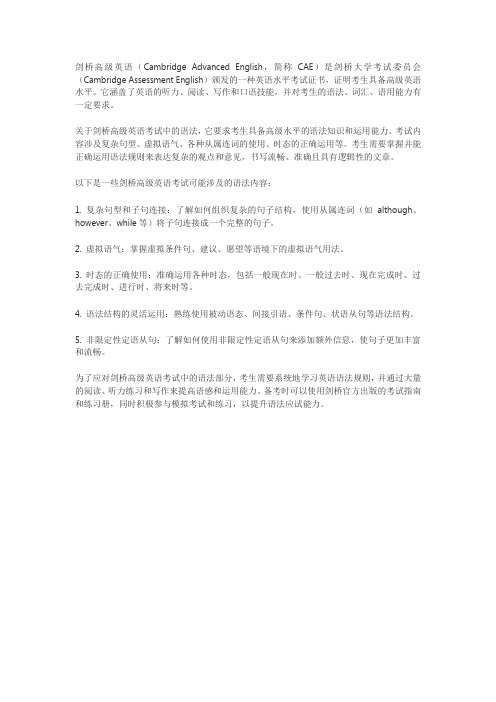
剑桥高级英语(Cambridge Advanced English,简称CAE)是剑桥大学考试委员会(Cambridge Assessment English)颁发的一种英语水平考试证书,证明考生具备高级英语水平。
它涵盖了英语的听力、阅读、写作和口语技能,并对考生的语法、词汇、语用能力有一定要求。
关于剑桥高级英语考试中的语法,它要求考生具备高级水平的语法知识和运用能力。
考试内容涉及复杂句型、虚拟语气、各种从属连词的使用、时态的正确运用等。
考生需要掌握并能正确运用语法规则来表达复杂的观点和意见,书写流畅、准确且具有逻辑性的文章。
以下是一些剑桥高级英语考试可能涉及的语法内容:
1. 复杂句型和子句连接:了解如何组织复杂的句子结构,使用从属连词(如although、however、while等)将子句连接成一个完整的句子。
2. 虚拟语气:掌握虚拟条件句、建议、愿望等语境下的虚拟语气用法。
3. 时态的正确使用:准确运用各种时态,包括一般现在时、一般过去时、现在完成时、过去完成时、进行时、将来时等。
4. 语法结构的灵活运用:熟练使用被动语态、间接引语、条件句、状语从句等语法结构。
5. 非限定性定语从句:了解如何使用非限定性定语从句来添加额外信息,使句子更加丰富和流畅。
为了应对剑桥高级英语考试中的语法部分,考生需要系统地学习英语语法规则,并通过大量的阅读、听力练习和写作来提高语感和运用能力。
备考时可以使用剑桥官方出版的考试指南和练习册,同时积极参与模拟考试和练习,以提升语法应试能力。
剑桥语法知识点总结

剑桥语法知识点总结剑桥语法知识点是英语学习中非常重要的一部分,掌握好剑桥语法知识点对提高英语水平非常有帮助。
在考试中,如果能掌握好剑桥语法知识点,可以帮助我们更好地理解和使用英语,提高我们的得分。
下面是一些剑桥语法知识点的总结。
一、主谓一致主谓一致是指主语和谓语在人称和数上保持一致。
在英语的基本句型中,主语和谓语的一致性是非常重要的,否则句子就会出现语法错误。
1. 单数主语与单数谓语例如:The cat is sleeping.2. 复数主语与复数谓语例如:The cats are sleeping.3. 特殊情况(集体名词、不可数名词、单数形式)例如:The team is winning.例如:The water is boiling.例如:The news is good.二、动词时态动词时态表示动作或者状态发生的时间,包括一般现在时、一般过去时、一般将来时、现在进行时、过去进行时、将来进行时、现在完成时、过去完成时、将来完成时等。
掌握好动词时态的用法,可以帮助我们正确地表达出我们的意思。
1. 一般现在时表示现在进行的动作或者状态,一般现在时用于表示经常性的动作或常态。
例如:I play football every day.2. 一般过去时表示过去发生的动作或者状态,一般过去时用于某个过去的时间。
例如:I played football yesterday.3. 一般将来时表示将来要发生的动作或者状态,一般将来时用于表示将来的某个时间。
例如:I will play football tomorrow.4. 现在进行时表示现在正在进行的动作,现在进行时用于表示现在正在进行的动作。
例如:I am playing football now.5. 过去进行时表示过去正在进行的动作,过去进行时用于表示过去某个时间正在进行的动作。
例如:I was playing football when it started raining.6. 将来进行时表示将来某个时间正在进行的动作,将来进行时用于表示将来某个时间正在进行的动作。
剑桥入门级至四级语法
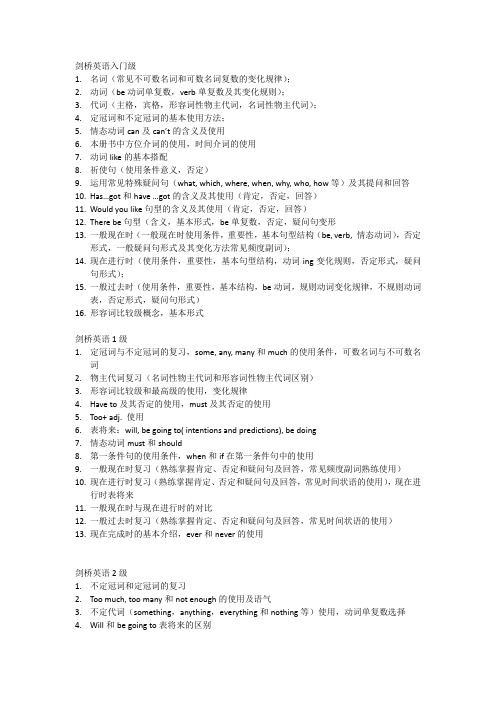
剑桥英语入门级1.名词(常见不可数名词和可数名词复数的变化规律);2.动词(be动词单复数,verb单复数及其变化规则);3.代词(主格,宾格,形容词性物主代词,名词性物主代词);4.定冠词和不定冠词的基本使用方法;5.情态动词can及can’t的含义及使用6.本册书中方位介词的使用,时间介词的使用7.动词like的基本搭配8.祈使句(使用条件意义,否定)9.运用常见特殊疑问句(what, which, where, when, why, who, how等)及其提问和回答10.Has…got和have …got的含义及其使用(肯定,否定,回答)11.Would you like句型的含义及其使用(肯定,否定,回答)12.There be句型(含义,基本形式,be单复数,否定,疑问句变形13.一般现在时(一般现在时使用条件,重要性,基本句型结构(be, verb,情态动词),否定形式,一般疑问句形式及其变化方法常见频度副词);14.现在进行时(使用条件,重要性,基本句型结构,动词ing变化规则,否定形式,疑问句形式);15.一般过去时(使用条件,重要性,基本结构,be动词,规则动词变化规律,不规则动词表,否定形式,疑问句形式)16.形容词比较级概念,基本形式剑桥英语1级1.定冠词与不定冠词的复习,some, any, many和much的使用条件,可数名词与不可数名词2.物主代词复习(名词性物主代词和形容词性物主代词区别)3.形容词比较级和最高级的使用,变化规律4.Have to及其否定的使用,must及其否定的使用5.Too+ adj. 使用6.表将来:will, be going to( intentions and predictions), be doing7.情态动词must和should8.第一条件句的使用条件,when和if在第一条件句中的使用9.一般现在时复习(熟练掌握肯定、否定和疑问句及回答,常见频度副词熟练使用)10.现在进行时复习(熟练掌握肯定、否定和疑问句及回答,常见时间状语的使用),现在进行时表将来11.一般现在时与现在进行时的对比12.一般过去时复习(熟练掌握肯定、否定和疑问句及回答,常见时间状语的使用)13.现在完成时的基本介绍,ever和never的使用剑桥英语2级1.不定冠词和定冠词的复习2.Too much, too many和not enough的使用及语气3.不定代词(something,anything,everything和nothing等)使用,动词单复数选择4.Will和be going to表将来的区别5.When和while在引导时间状语从句时的异同6.Must和have to及其否定间的区别7.可能性:情态动词will和may/ might的比较(含否定)8.形容词和副词的比较级和最高级变化规则复习,可修饰的频度副词9.后加ing动词和to do动词的总结10.反义疑问句含义,变化形式11.直接引语和间接引语(概念介绍,转换时时态的变化)12.定语从句的基本介绍(定语,先行词,关系词,作用)13.第一条件句中unless的使用,与if的转换;14.第二条件句(含义,基本形式,与第一条件句的对比)15.一般现在时,现在进行时,一般过去时复习和对比(句型形式,使用条件,变化形式,动词变化规律,特殊使用情况)16.一般现在时被动(基本形式,否定形式,疑问句形式)17.现在完成时使用条件复习,just/ already/ still/ yet的使用及语气,for和since的使用区别18.现在完成进行时(基本形式,重要性,否定,疑问句及其回答)19.现在完成时和现在完成进行时的对比20.过去完成时基本介绍(基本句型结构,使用条件,否定,疑问句,与一般现在时的对比及联系)剑桥英语3级1.时态复习(一般现在时,现在进行时,一般过去时,过去进行时,一般将来时,现在完成时)和对比(一般过去时和现在完成时,现在完成时和现在完成进行时,一般过去时和过去完成时)2.常见时间连词的使用ed to和be used to使用方法及区别4.Had better/ should/ ought to的使用和区别5.使役动词have和make6.Make/ let/ be allowed to的使用及其区别7.后加ing动词和to do动词的复习与补充8.常见表obligation, prohibition, permission情态动词的总结9.表对比连接词的使用10.在一般现在时中表推断的情态动词11.在一般过去时中表推断的情态动词12.直接引语和间接引语复习(形式,转换时时态的变化规则)13.第一条件句与第二条件句的复习(形式,语气对比),补充wish和if only在虚拟语气中的应用14.第三条件句(基本形式,语气,与一二条件句的对比)15.虚拟语气总结(if,wish,if only等)和补充(常见动及名词等)16.被动(一般现在时,一般过去时,一般将来时,现在完成时等时态中的具体形式,被动句的使用原因等)17.定语从句(复习与补充,如:关系副词,that与which区别,关系代词和关系副词的转换等)与非限定性定语从句(形式,与限定性的区别,as和which等)18.名词性从句的基本介绍(主语从句,表语从句,宾语从句,同位语从句)剑桥英语4级1.时态复习(过去,现在,将来等),2.被动复习(过去,现在,将来等),补充进行时中的被动,过去完成时和过去完成进行时的被动3.定语从句和非限定性定语从句4.直接引语和间接引语复习5.后加ing动词和to do动词的复习和补充6.反义疑问句复习7.Need用法(情态动词,实义动词)8.What引导的名词性从句9.倒装10.间接疑问句和直接疑问句(语序,时态转换等)11.情态动词用法总结(基本用法(能力,许可,命令,义务等),表推测(对过去和现在的推测),表责备,表委婉等)12.第一至三条件句复习,混合条件句,零条件句的讲解(重要性,含义,基本形式,与其他条件句的区分)13.将来完成时和将来进行时的讲解(基本形式,使用条件,变形)14.定语从句中关系词的省略15.分词短语在句中的位置,与从句的转换16.状语从句(原因状语,地点状语,时间状语,目的状语及其常见连接词)17.Passive report structure。
纯干货对比评测国外最火的六种语法教材,看看哪种最适合你
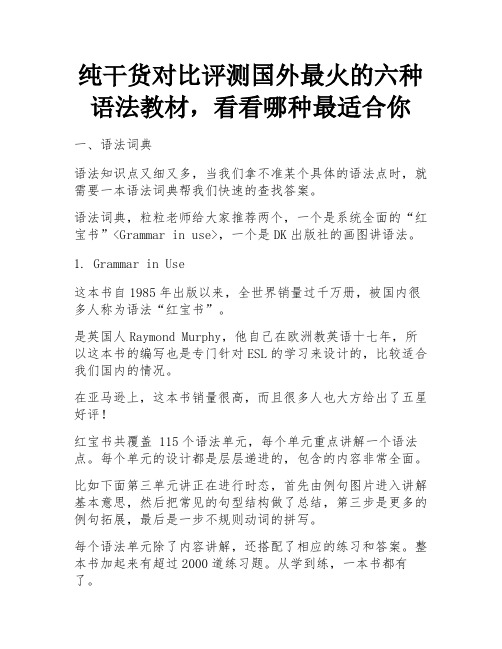
纯干货对比评测国外最火的六种语法教材,看看哪种最适合你一、语法词典语法知识点又细又多,当我们拿不准某个具体的语法点时,就需要一本语法词典帮我们快速的查找答案。
语法词典,粒粒老师给大家推荐两个,一个是系统全面的“红宝书”<Grammar in use>,一个是DK出版社的画图讲语法。
1. Grammar in Use这本书自1985年出版以来,全世界销量过千万册,被国内很多人称为语法“红宝书”。
是英国人Raymond Murphy,他自己在欧洲教英语十七年,所以这本书的编写也是专门针对ESL的学习来设计的,比较适合我们国内的情况。
在亚马逊上,这本书销量很高,而且很多人也大方给出了五星好评!红宝书共覆盖 115个语法单元,每个单元重点讲解一个语法点。
每个单元的设计都是层层递进的,包含的内容非常全面。
比如下面第三单元讲正在进行时态,首先由例句图片进入讲解基本意思,然后把常见的句型结构做了总结,第三步是更多的例句拓展,最后是一步不规则动词的拼写。
每个语法单元除了内容讲解,还搭配了相应的练习和答案。
整本书加起来有超过2000道练习题。
从学到练,一本书都有了。
书后的语法知识点的索引也非常实用,可以帮助我们快速定位语法点。
比如下面介词 in 的介绍,就包含了常见搭配,in + 时间,in + 地点,in+未来时间等,最后针对in 和 to 这两个常见介词还做了对比。
Grammar in use 系列一共三本,大部分的语法点是重合的,但是例句和练习的难度会逐步上升,适合不同水平的学习者。
如果想选一套英文原版的语法词典,这套书就是非常好的选择。
2. English for everyoneDK出版社这套语法书并不厚重,最突出的特色是画图讲语法。
很多语法知识点不容用语言说清楚,但是一张图就搞定了。
比如下面讲是陈述句变疑问句,当我们提问主语和提问宾语的时候,句子的语序就不相同。
这个语法点用话说不清楚,但是一画图就明白了。
剑桥初级英语语法pdf

剑桥初级英语语法pdf关于剑桥初级英语语法pdf作为一名学习英语的初学者,我们需要提高语法的功底,毕竟语法是英语的基础。
在学习语法时,我们可以选择使用剑桥初级英语语法pdf,下面,我将从以下四个方面介绍一下这本pdf的特点。
一、全面的语法知识剑桥初级英语语法pdf 全面覆盖英语语法的基本知识。
不管是长难句的分析还是名词、动词、形容词等基本语法的介绍,都被涵盖在这本pdf中。
十分详细,让学生可以全面了解英语语法的基本知识。
二、易懂的语言表述一本好的语法书,不仅需要有全面的知识点,还需要能够以简单易懂的语言表述出来。
而剑桥初级英语语法pdf 在语言表述上十分出色,不仅能够让学生轻松理解,而且也能够让学生印象深刻,大大提高了学习效果。
三、丰富的练习题语法的学习需要不断的练习才能够掌握,而剑桥初级英语语法pdf 提供了大量的练习题,题目涵盖了语法知识的各个方面,并且根据难易程度逐渐递进。
这样的设计不仅能让学生逐渐适应各种题目类型,还能够帮助他们提升英语语法的能力。
四、方便的学习方式最后一点是关于学习方式的问题。
剑桥初级英语语法pdf 可以方便地在电脑、手机等各个设备上查看,而且可以随时随地的学习,在通勤、等车、休息等等任何时间都可以打开pdf进行学习。
这样的学习方式方便快捷,也能够让人更加专注于学习。
综上所述,剑桥初级英语语法pdf 是一本非常优秀的语法学习资料,不仅能够全面覆盖英语语法的基本知识,还能够以简单易懂的语言表述出来,提供了多种类型的练习题,最重要的是可以随时随地的学习。
这本pdf对于英语初学者来说是一本绝佳的学习资料,帮助他们打下牢固的英语语法基础,助力他们后续的英语学习。
学习英语语法的工具书

学习英语语法的工具书在当今世界,英语已经成为世界各国共同的语言。
学英文,一本好的词典是一大助力。
如今工具书品种繁多,到底用哪种好?下面是店铺为你整理的学习英语语法工具书,希望大家喜欢!学习英语语法的工具书词汇类Oxford American Dictionary for learners of English牛津美语字典[英语学习者]适用人群:适合正在学英语的学生党,或想系统学习的初学者。
推荐指南:这本字典包括42000个单词,短语和释义也非常专业、学术化。
除了单词,还有学术词汇表,涵盖数学、科学和社会研究等方面,是学术写作的必备字汇。
在一个单词的解释中,除了常见的音标、常用短语、造句等,还有同义词解析。
有了同义词解析,在学1个词的同时,还可以学更多的单词,而且还不会搞错它们的用法和意思。
Grammar Girl's 101 Misused Words You'll Never Confuse Again语法女孩:101对最容易误用的单词解析适用人群:经常搞不清单词意思的同学。
推荐指南:作者MIGNON FOGARTY是一个外国知名博主,最火的时候她的语法博客每周阅读量都超过30万。
这本书也是在美国亚马逊上,最受欢迎的英语工具书之一。
老外的评价是“特别有趣,看了之后能让我清楚地知道如何使用这些单词。
”语法类English Grammar For Dummies英语语法大全适用人群:语法基础学习者推荐指南:系统地学习基础的英语语法,包括动词、形容词、副词等的实用方法;介词、代词的使用场合;标点符号的正确实用;所有格的规则,还包括了提高口语演讲能力。
Practical English Usage牛津英语用法指南适用人群:英语初学者/英语教师,常用英语对话或写作的职场人士。
推荐指南:这本书以语法为主,同时也包括了词汇、发音、修辞等各方面。
主要针对非英语国家的学习者常犯的错误,来重点解析。
译林剑桥七年级上学期英语语法总结
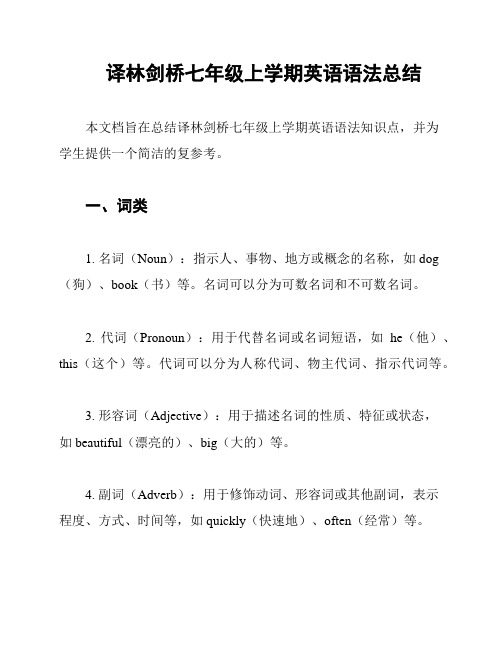
译林剑桥七年级上学期英语语法总结本文档旨在总结译林剑桥七年级上学期英语语法知识点,并为学生提供一个简洁的复参考。
一、词类1. 名词(Noun):指示人、事物、地方或概念的名称,如dog (狗)、book(书)等。
名词可以分为可数名词和不可数名词。
2. 代词(Pronoun):用于代替名词或名词短语,如he(他)、this(这个)等。
代词可以分为人称代词、物主代词、指示代词等。
3. 形容词(Adjective):用于描述名词的性质、特征或状态,如beautiful(漂亮的)、big(大的)等。
4. 副词(Adverb):用于修饰动词、形容词或其他副词,表示程度、方式、时间等,如quickly(快速地)、often(经常)等。
5. 动词(Verb):表示动作、状态或存在,如run(跑)、play(玩)等。
动词可以分为及物动词和不及物动词。
6. 介词(Preposition):用于表达时间、地点、方向等关系,如in(在)、on(在上面)等。
7. 连词(Conjunction):用于连接句子、词或词组,如and (和)、but(但是)等。
8. 冠词(Article):用于限定名词的范围,分为定冠词a/an和不定冠词the。
9. 数词(Numeral):表示数目的词语,如one(一)、two (二)等。
10. 感叹词(Interjection):表示强烈的情感或感叹的词语,如oh(哦)、wow(哇)等。
二、时态1. 一般现在时(Simple Present):表示经常性或普遍性的动作、状态或事实,如I go to school every day(我每天去学校)。
2. 现在进行时(Present Continuous):表示现在正在进行的动作,如She is reading a book(她正在读书)。
3. 一般过去时(Simple Past):表示过去发生的动作或状态,如He played football yesterday(他昨天踢足球)。
培生英语语法和剑桥英语语法

培生英语语法和剑桥英语语法Pearson English Grammar and Cambridge English Grammarare two widely used grammar resources for English learners. These books provide comprehensive explanations, examples, and exercises to help learners improve their grammar skills. Here is a comparison between the two:1. Content:- Pearson English Grammar: This book covers all major grammar topics, including parts of speech, sentence structure, verb tenses, conditionals, reported speech, and more. It provides clear explanations and examples to help learners understand each grammar concept.- Cambridge English Grammar: Similarly, this book covers a wide range of grammar topics, including parts of speech, verb forms, tenses, conditionals, modals, and more. It also offers detailed explanations and examples to aid learnersin grasping the grammar rules.2. Approach:- Pearson English Grammar: This book follows asystematic approach, starting with basic grammar conceptsand gradually progressing to more advanced topics. Itallows learners to build a solid foundation and gradually expand their grammar knowledge.- Cambridge English Grammar: The book also follows a systematic approach, introducing grammar topics in alogical sequence. It focuses on providing learners with a deep understanding of grammar rules and their usage.3. Exercises:- Pearson English Grammar: This book offers a wide range of exercises, including fill-in-the-blanks, multiple-choice, and sentence transformation exercises. These exercises provide learners with ample practice opportunities to reinforce their understanding of grammar concepts.- Cambridge English Grammar: Similarly, this bookincludes various exercises, such as gap-filling, sentence completion, and error correction exercises. These exercises aim to help learners apply grammar rules in different contexts.4. Additional Resources:- Pearson English Grammar: In addition to the main textbook, Pearson also provides supplementary resources, such as workbooks and online practice exercises. These resources allow learners to further practice and reinforce their grammar skills.- Cambridge English Grammar: Similarly, Cambridge offers supplementary materials, including workbooks, onlinepractice tests, and interactive activities. Theseadditional resources provide learners with extra practice and reinforcement.In conclusion, both Pearson English Grammar and Cambridge English Grammar are comprehensive grammar resources that can greatly benefit English learners. They provide clear explanations, examples, and exercises to help learners understand and apply grammar rules correctly. Whether you choose Pearson or Cambridge, consistentpractice and application of grammar rules are essential for improving your English proficiency.培生英语语法和剑桥英语语法都是广泛使用的英语学习语法资源。
剑桥初级英语语法和剑桥中级英语语法

剑桥初级英语语法和剑桥中级英语语法全文共6篇示例,供读者参考篇1Learning English GrammarHi there! My name is Chris and I'm going to teach you all about English grammar today. Grammar can seem really boring and confusing at first, but it's actually pretty fun once you get the hang of it. It's like learning the rules of a new game - it might take some practice, but once you know how to play, you can have a great time!Let's start with some of the basics. Every sentence in English needs a subject and a verb. The subject is what or who the sentence is about. The verb is the action word that tells us what the subject is doing. For example:The cat meows."The cat" is the subject, and "meows" is the verb.You run quickly."You" is the subject, and "run" is the verb.Pretty simple, right? Now let's look at some different kinds of verbs. Verbs can show if something happened in the past, is happening now, or will happen in the future.For example:Past: I walked to the park yesterday.Present: I walk to the park every day.Future: I will walk to the park tomorrow.We change the verb a little bit for each different time. "Walked" is the past tense, "walk" is the present tense, and "will walk" is the future tense.Verbs also need to agree with their subjects. If the subject is singular (one thing/person), the verb stays the same. But if the subject is plural (more than one thing/person), we often add "-s" or "-es" to the verb. Like this:The dog barks. (Singular subject, verb doesn't change)The dogs bark. (Plural subject, no "-s" on verb)The boy runs. (Singular subject, verb doesn't change)The boys run. (Plural subject, no "-s" on verb)Okay, let's move on to some intermediate grammar concepts. One really important thing in English is using the right prepositions. Prepositions are little words like "in", "on", "under", "between", etc. that show the relationship between different words in a sentence.For example:The book is on the table.The cat is under the bed.I am standing between my friends.Using the wrong preposition can really change the whole meaning of the sentence, so you have to be careful!Another thing to learn is how to make negative sentences and ask questions properly. To make a negative sentence, we usually add "not" after the subject and verb. Like this:I do not like spinach.They are not watching TV.To ask a question, we often switch around the subject and verb. Instead of saying "You are happy", we say "Are you happy?"Let me give you some more examples of questions:Do you want to go to the park?Where is the library?Why did the chicken cross the road?Pretty tricky, huh? Don't worry, it takes a while to get used to making negatives and asking questions the right way.Phew, we've covered a lot of grammar ground so far! Let's take a little break. Why don't you go run around outside for a few minutes to stretch your legs? I'll be right here waiting when you get back....Welcome back! Did you have fun on your break? Now let's talk about one more important grammar concept - relative clauses. Relative clauses are kind of like little bonus sentences that give us more information about a noun.For example:I have a dog that barks a lot."That barks a lot" is the relative clause giving more info about "a dog."Or another example:The book which I read last night was really good."Which I read last night" is the relative clause describing "the book."Using relative clauses allows us to pack a lot more detail into our sentences in a clear, easy-to-understand way.There are a few different relative pronouns we can use to introduce these clauses, like "that", "which", "who", "whose", and others. The relative pronoun we choose depends on whether we're talking about a thing or a person.Getting the right relative pronoun can be tricky at first, but with practice it will start to feel really natural.Wow, you made it all the way through my grammar lesson! You learned so much about subjects, verbs, tenses, prepositions, questions, negatives, and relative clauses. I'm really proud of you for working so hard.Grammar is one of the most important things to learn when you're studying English. Once you've got a solid understanding of all the grammar rules, it becomes much easier to construct clear, meaningful sentences and communicate effectively.Just keep practicing, ask questions when you're confused, and don't get discouraged. Pretty soon, all of this grammar stuffwill be old hat to you. You'll be using perfect verb tenses and whipping out relative clauses like a pro!Thanks for being such an awesome student today. Keep up the great work, and I'll see you next time for another fun grammar adventure!篇2Learning English Grammar is Fun!Hi there, friends! Are you ready to learn about English grammar in a fun way? Grammar might sound a bit boring, but it's actually super important if you want to speak and write English clearly. Don't worry, I'll explain everything in a simple way that's easy to understand. Let's get started!For Beginners:Let's start with the basics. As you may know, every sentence in English has a subject and a verb. The subject is what or who the sentence is about, and the verb is the action word. For example:"I (subject) run (verb).""The cat (subject) sleeps (verb)."Pretty simple, right? Now let's look at some other important things for beginners.ArticlesIn English, we use little words called articles before nouns. There are three articles: a, an, and the. We use "a" and "an" when talking about something for the first time, and "the" when we've mentioned it before or when it's specific."I have a cat." (First mention)"The cat is sleeping." (We've mentioned the cat before)Verb TensesVerbs can change their form to show when the action happens - in the past, present or future. Let's look at the three main tenses:Present: "I play soccer."Past: "I played soccer yesterday."Future: "I will play soccer tomorrow."Nouns and PluralsNouns are words for people, places or things. Most nouns become plural (meaning more than one) by adding "s" at the end."One cat.""Two cats."For Intermediate Learners:Great job so far! Now that you've got the basics down, let's move on to some intermediate grammar topics.Adjectives and AdverbsAdjectives describe nouns, and adverbs describe verbs, adjectives or other adverbs. Adjectives usually come before the noun they describe, and adverbs often (but not always) end in "-ly"."The big dog" (Big is an adjective describing the dog)"The dog runs quickly." (Quickly is an adverb describing how the dog runs)PrepositionsPrepositions are words that show the relationship between a noun or pronoun and other words in the sentence. Some common prepositions are: in, on, at, under, over, etc."The book is on the table.""We played soccer in the park."ConditionalsConditional sentences describe a possible situation and its consequences. They often start with "if"."If it rains, we will stay inside.""I would be happy if I got an A on my test."Relative ClausesRelative clauses give extra information about a noun. They usually start with words like "who", "which", "that", etc."My brother, who lives in France, is visiting next week.""The book that I'm reading is really interesting."Wow, you've learned so much already! Keep practicing these grammar rules, and you'll be speaking and writing English like a pro in no time. Grammar can take a while to fully understand, but the more you use it, the easier it will become. Don't be afraid tomake mistakes - that's how we learn! Just keep an open mind, ask questions when you're confused, and most importantly, have fun with the English language. See you next time!篇3Learning English Grammar: A Fun Adventure!Hey there, fellow learners! Are you ready to embark on an exciting journey through the world of English grammar? Believe it or not, mastering grammar can be a blast! Let's dive in and explore the basics together.First up, let's talk about parts of speech. These are the building blocks of sentences, just like Lego bricks are for your awesome creations! There are eight main parts of speech: nouns, pronouns, verbs, adjectives, adverbs, prepositions, conjunctions, and interjections.Nouns are the naming words, like "cat," "teacher," or "happiness." Pronouns are little words that take the place of nouns, such as "she," "it," or "they." Verbs are the action words that describe what's happening, like "run," "think," or "exist."Adjectives are the describing words that tell us more about nouns, for example, "red apple" or "tall building." Adverbsdescribe verbs, adjectives, or even other adverbs, like "slowly walking" or "extremely hot."Prepositions show the relationship between other words, such as "under the table" or "after school." Conjunctions join words or sentences together, like "and," "but," or "because." Finally, interjections express emotion or feeling, like "Wow!" or "Oops!"Now, let's move on to sentences! A sentence is a group of words that express a complete thought. There are four main types of sentences: declarative (stating a fact), interrogative (asking a question), imperative (giving a command), and exclamatory (expressing strong emotion).For example, "The sun is shining" is a declarative sentence. "Are you coming to the party?" is an interrogative sentence. "Please close the door" is an imperative sentence. And "What a beautiful day!" is an exclamatory sentence.Next up, we have verb tenses. These help us talk about when something happened, is happening, or will happen. The three main tenses are past, present, and future.For example, "I played soccer yesterday" is in the past tense. "I play soccer every Saturday" is in the present tense. And "I will play soccer tomorrow" is in the future tense.There are also progressive tenses (like "I am playing soccer") and perfect tenses (like "I had played soccer"). But don't worry, we'll cover those in more detail later!Speaking of later, let's talk about intermediate grammar topics. One important concept is subject-verb agreement. This means that the subject and verb in a sentence must agree in number (singular or plural).For example, "The cat meows" is correct because "cat" (singular) agrees with "meows" (singular). But "The cats meow" is correct because "cats" (plural) agrees with "meow" (plural).Another key topic is clauses. A clause is a group of words with a subject and a verb. There are two main types: independent clauses (which can stand alone as a sentence) and dependent clauses (which need an independent clause to complete the thought).For instance, "My friend loves to read" is an independent clause. But "Because my friend loves to read" is a dependent clause that needs an independent clause to make sense, like"Because my friend loves to read, she always has a book with her."Finally, let's talk about punctuation. These little marks help make our writing clear and easy to understand. Some common punctuation marks include periods, commas, question marks, exclamation points, apostrophes, and quotation marks.For example, periods end declarative and imperative sentences. Commas separate items in a list or clauses in a sentence. Question marks go at the end of interrogative sentences. Exclamation points show strong emotion or excitement. Apostrophes show possession or contractions. And quotation marks surround direct quotes or words used in a special way.Phew, that was a lot of grammar goodness! But don't worry, with practice and patience, you'll become a grammar master in no time. Just remember to have fun and enjoy the journey. After all, learning English is an adventure waiting to be explored!篇4Title: Fun with English Grammar!Hi there, friends! Are you ready to have some fun with English grammar? I know, I know, grammar might sound a bit boring at first, but trust me, it can actually be really cool and helpful for learning English.Let's start with the basics – what is grammar? Well, grammar is like a set of rules that tell us how to use words correctly to form sentences. It's kind of like a secret code that all English speakers need to know to communicate clearly.Now, let's talk about the Cambridge English Grammar books. These books are specially designed to teach you grammar in a fun and easy-to-understand way.The Cambridge English Grammar for Beginners book is perfect for those of you who are just starting to learn English. It covers all the basic grammar rules, like how to use verbs (action words like "run," "jump," and "sing"), nouns (words for people, places, and things), and adjectives (describing words like "big," "small," and "colorful").One of the coolest things about this book is that it uses lots of pictures and examples to help you understand the grammar rules. For example, if you're learning about verbs, you might see a picture of a kid kicking a ball, with the sentence "She kicks the ball" written underneath. How awesome is that?The Cambridge English Grammar for Intermediate Learners book is for those of you who have already learned the basics and want to take your English skills to the next level. This book covers more advanced grammar topics, like how to use different verb tenses (past, present, and future), modal verbs (words like "can," "should," and "must"), and conditional sentences ("If it rains,we'll stay inside").Just like the beginner book, the intermediate book uses lots of examples and fun activities to help you practice the grammar rules. For instance, you might have to fill in the blanks with the correct verb tense or match modal verbs with their meanings.But grammar isn't just about memorizing rules – it's also about understanding how to use those rules to communicate effectively. That's why both of these Cambridge English Grammar books also include sections on writing and speaking activities, so you can practice using the grammar rules in real-life situations.For example, you might have to write a short story using different verb tenses or have a conversation with a partner using modal verbs. It's like playing a game, but you're also learning valuable English skills at the same time!Now, I know what you might be thinking: "But grammar is so hard! How can I make it easier to learn?"Well, my friends, I have a few tricks up my sleeve:Practice, practice, practice! The more you use the grammar rules, the easier they'll become. Try to incorporate what you've learned into your everyday English conversations and writing.Don't be afraid to make mistakes. Making mistakes is a natural part of learning, and it's actually a great way to learn what you need to improve on.Have fun with it! Learning grammar doesn't have to be boring. Try turning it into a game or a competition with your friends to see who can use the grammar rules correctly the most times.Use resources like the Cambridge English Grammar books. They're designed to make learning grammar enjoyable and easy to understand.So, what do you say? Are you ready to become a grammar master? With the help of the Cambridge English Grammar books and a little bit of practice, you'll be speaking and writing like a pro in no time!Remember, learning grammar is an important part of mastering the English language, but it doesn't have to be a chore. Just think of it as a fun puzzle to solve, and before you know it, you'll be communicating with confidence and clarity.Happy learning, my friends!篇5Cambridge English Grammar: A Fun Guide for Little LearnersHi there, little language learners! Are you ready to dive into the exciting world of English grammar? Don't worry; it's not as scary as it sounds. Trust me, learning grammar can be a lot of fun, and it's an essential part of mastering the English language. So, put on your thinking caps, and let's get started!Let's begin with the basics: Beginner English Grammar. These are the building blocks that will help you construct simple sentences and communicate effectively.Parts of Speech: Every word in the English language belongs to a specific part of speech. There are eight main parts of speech: nouns, pronouns, verbs, adjectives, adverbs, prepositions, conjunctions, and interjections. Nouns are the naming words, like "cat" or "book." Pronouns replace nouns, like "it" or "them."Verbs are action words, like "run" or "sing." Adjectives describe nouns, like "big" or "beautiful." Adverbs describe verbs, like "quickly" or "loudly." Prepositions show relationships between words, like "on" or "under." Conjunctions join words or sentences together, like "and" or "but." And interjections express emotions, like "wow!" or "ouch!"Sentence Structure: A basic sentence in English has two main parts: a subject and a predicate. The subject is the noun or pronoun that the sentence is about, and the predicate is the verb and the words that go with it. For example, "The cat (subject) chased (verb) the mouse (object)."Verb Tenses: Verbs can change their form to show when an action happens. The three main tenses are present tense (for things happening now), past tense (for things that already happened), and future tense (for things that will happen). For instance, "I walk (present) to school," "I walked (past) to school yesterday," and "I will walk (future) to school tomorrow."Now, let's move on to Intermediate English Grammar, where we'll explore more advanced concepts.Modals: Modals are helping verbs that express ideas like ability, permission, obligation, and certainty. Some commonmodals are "can," "could," "should," "would," and "must." For example, "I can swim," or "You must finish your homework."Passive Voice: In the active voice, the subject performs the action. In the passive voice, the subject receives the action. For instance, "The boy (subject) kicked (verb) the ball (object)" is active voice, while "The ball (subject) was kicked (verb) by the boy" is passive voice.Conditionals: Conditionals are sentences that express hypothetical situations. They usually have two parts: the "if" clause and the main clause. For example, "If I study hard (if clause), I will get good grades (main clause)."Reported Speech: When we report what someone said, we use reported speech. The tenses and pronouns often change. For instance, "She said, 'I am hungry'" becomes "She said she was hungry" in reported speech.Relative Clauses: Relative clauses provide additional information about a noun or pronoun. They start with relative pronouns like "who," "which," or "that." For example, "The book, which is on the table, is mine."Phew! That was a lot of information, but you did great, little learners! Remember, practice makes perfect, so keep practicingthese grammar rules, and you'll be speaking and writing English like a pro in no time!Don't forget to have fun and be patient with yourself. Learning a new language is a journey, and every step counts. Keep up the great work, and happy learning!篇6Learning English GrammarHi there! Are you learning English grammar? That's great! Grammar can seem tricky at first, but it's really important for understanding how to put sentences together correctly. Don't worry though, I'm here to help make it fun and easy to understand. Let's get started!The BasicsLet's begin with some of the most basic building blocks of grammar - words! There are a few main types:Nouns are words that name people, places, things or ideas. For example: girl, park, book, happiness.Verbs are action words that describe what someone or something does. Like run, jump, think, exist.Adjectives describe nouns by telling us more about them. Words like big, small, colorful, delicious.Pronouns are little words that take the place of nouns to avoid repeating them. Examples are he, she, it, they.Those are some of the biggest players in grammar. But how do you use them properly? That's where sentence structure comes in!Subject, Verb, ObjectMost basic sentences have a subject (what the sentence is about), a verb (the action), and sometimes an object (what receives the action).For example: The girl (subject) kicked (verb) the ball (object).You can make super simple sentences with just a subject and verb though, like "I am" or "Birds fly."To describe the subject, you add adjectives before it. "The happy girl kicked the red ball."You can also ask questions by switching the subject and verb around. "Did the girl kick the ball?"Pretty easy so far, right? Those basics will get you started with making all kinds of simple sentences. But English has a lotmore complex grammar too. Things start getting trickier as you move into intermediate territory.Verb TensesOne of the fundamentally important aspects of grammar is verb tenses. This allows you to describe when an action happened.The simple present tense describes something happening now. "I play soccer every Saturday."The simple past tense is for completed actions. "I played soccer yesterday."And the future tense is for things that haven't happened yet. "I will play soccer tomorrow."There are also continuous tenses like "I am playing soccer right now" for ongoing actions. And perfect tenses like "I have played soccer" for describing experience with an action.Mastering all the different tenses is critical for accurately conveying the timing of events when you speak and write. It's one of the trickier parts of English grammar.Punctuation MattersAnother key part of proper grammar is using punctuation correctly. This includes periods, commas, question marks, exclamation points and more.Periods go at the end of complete statements to indicate they are finished thoughts.Commas separate things in lists and parts of compound sentences.Question marks indicate a sentence is asking something, and exclamation points show excitement or emphasis.There are a bunch of other punctuation rules too about using apostrophes, quotation marks, colons, semicolons and more. Punctuation might seem small, but it's super important for making your writing clear and easy to understand.Next Level GrammarOnce you've got a firm grip on the basics and verb tenses, there's a whole other world of advanced grammar out there. Here are just a few examples:Phrasal verbs are combinations of verbs and prepositions that create idiomatic expressions like "put up with," "run into," and "look forward to."The passive voice flips sentence structure around to emphasize the recipient of the action instead of the doer. For instance: "The ball was kicked by the girl."Conditional sentences use "if" statements to express hypothetical or subjunctive scenarios. "If I were taller, I could be a basketball player."Relative clauses add extra detail to sentences using words like "that," "which," "who" and more. "My friend, who loves books, went to the library."Those are just the tip of the iceberg! As you keep learning, you'll discover increasingly complex grammatical concepts. Don't get overwhelmed though. Just take it step-by-step.Grammar is PowerfulGrammar might seem like a bunch of boring rules at first. But having a solid grasp of it gives you power as a speaker and writer of English.With good grammar skills, you can convey your exact meaning clearly and precisely. You can tell stories more vividly. You can argue more persuasively. You can express yourself with creativity and personality.Stick with it, keep practicing, and have fun along the way! Before you know it, you'll be a grammar master. And that's a tool that will serve you for life as you use English. Pretty cool, right?Well, that's all for my grammar lesson today. Let me know if any part was confusing or if you have other questions. Just remember, learning a new language is a journey, not a race. Take your time, don't get discouraged, and I'm here to help however I can!。
剑桥高级英语语法

剑桥高级英语语法随着全球化的发展,英语作为国际交流的语言,其重要性不言而喻。
对于那些希望在国际舞台上大展拳脚的英语学习者来说,掌握剑桥高级英语语法是必不可少的。
本文将从以下几个方面讨论剑桥高级英语语法的学习和应用:引言、剑桥高级英语语法的主要特点、如何提高剑桥高级英语语法水平、剑桥高级英语语法的实际应用以及总结。
首先,让我们了解一下剑桥高级英语语法的背景和重要性。
剑桥高级英语语法是指在剑桥英语考试(如CAE、CPE等)中所需的语法知识。
这些考试是全球范围内最具权威的英语水平测试,被誉为英语学习者的“金牌标准”。
通过掌握剑桥高级英语语法,学习者可以更准确、有效地表达自己的观点,进一步提升了英语沟通能力。
接下来,我们来看看剑桥高级英语语法的主要特点。
首先,词汇丰富,表达精确。
剑桥高级英语文章通常使用词汇丰富、表达精确的语句来阐述观点。
其次,句子结构复杂,表达深入。
这意味着学习者需要掌握各种复杂的句子结构,以便在表达观点时更加深入、全面。
最后,语法规则系统化,易于理解。
剑桥高级英语语法书籍将语法规则系统地整理出来,帮助学习者更好地理解和运用。
那么,如何提高剑桥高级英语语法水平呢?首先,学习者需要掌握一套合适的学习策略。
这包括:系统学习语法规则,避免零碎、片面的知识;多读经典剑桥高级英语文章,积累语言素材;结合实际场景进行口语和写作练习,提高实际应用能力。
此外,备考剑桥英语考试时,要熟悉考试题型和难度,制定合理的学习计划,参加模拟考试,查漏补缺。
掌握了剑桥高级英语语法,学习者在学术和职业发展、文化交流和社交场合都将受益匪浅。
在学术领域,学习者可以撰写高质量的学术论文,为自己的研究打下坚实基础。
在职场上,剑桥高级英语语法将助力学习者提升沟通和表达能力,为职业发展铺平道路。
在国际文化交流中,学习者可以更准确地理解和表达复杂观点,增进与国际友人的交流和理解。
最后,让我们总结一下本文的主要内容。
剑桥高级英语语法的重要性不容忽视,学习者需掌握合适的方法和策略,不断提高自己的英语水平。
《剑桥英语语法》和《英语语法大全》之比较-文档资料

《剑桥英语语法》和《英语语法大全》之比较-文档资料《剑桥英语语法》和《英语语法大全》之比较[文献标识码]A1. 借鉴描述语法侧重理论导向Huddleston和Pullum坚持理论句法单层词组结构模型,强调功能种类,例如:补语、修饰语等。
Huddleston和Pullum认为分析要有说服力,“即使其他句法理论学家考虑诸多因素之后,也能和我们殊途同归”(Cambridge Grammar, 2002: 1032)。
他们反对坚持某种句法理论,也不想正式阐明要建立计算机测试的语法模型。
该书较多使用描述分析也意味不确定性,例如:形态和复合介词。
书中还使用语用学概念:原型、缺省、混象,这比较适合语法学家,而违背作者初衷。
本来描述语法只综合描述个别语言现象,通过实证和理论下结论。
而剑桥语法则不专门讨论理论语法,而是以理论导向描述语法,更注重严谨清晰公式推导,阐述分析有争议语言现象。
其理论导向也侧重语料法,从LOB,BROWN和澳大利亚ACE三大语料库300多万字条中选取例证,反对超强制语法概念。
Haddleson认为:若要归纳语法规律,即使最重视语料导向的语法也要使用模型或理论,至少要论述分析词性。
另一方面,理论语法要求读者多注意语料,看语言想表现什么内容。
(Jackendoff & Culicover, 2003: 528)。
剑桥语法中很多专业术语理论语言学家耳熟能详,作者用这类名词作为名词短语主要成分。
他们喜欢这些“大树”,因为这些“大树”和夸克的“矮树”相比,更加生动形象,更加直观地解析共同省略、范畴现象特别是共同梯度问题。
但对重新划分介词和副词,重新界定短语和从句主要成分有点牵强。
Haddleson 等人擅长描述语料,其语料有时缺乏全面分析;夸克则偏重语料,他从《英语用法研究》中开拓性使用语法实证研究。
哈氏们使用语料找到合适例证,还可证明可接受程度,研究英语变体,确定使用频率。
他们利用经过验证的例证。
剑桥高级英语语法

剑桥高级英语语法摘要:1.介绍剑桥高级英语语法书的背景和重要性2.书的结构及内容概述3.书的特点和优势4.针对不同学习者的建议和启示5.总结剑桥高级英语语法书的价值和作用正文:剑桥高级英语语法是一本为广大英语学习者提供帮助的权威教材。
该书由英国著名语言学家Joseph M.Williams编写,旨在满足高级英语学习者在语法学习方面的需求。
剑桥高级英语语法书的结构清晰,内容丰富。
全书共分为11个章节,涵盖了英语语法的基本知识和高级技巧。
从名词、动词、形容词到复合句、情态动词、非谓语动词等,每个章节都对相关语法点进行了详尽的讲解。
同时,书中还提供了大量实用的例句,以便学习者更好地理解和运用所学知识。
该书的特点在于,它不仅适合英语学习者自我学习,还可以作为课堂教学的教材。
书中设有丰富的练习题,有助于巩固所学内容。
此外,剑桥高级英语语法还注重培养学习者的语感和语言表达能力,使其在掌握语法知识的基础上,能够更好地应用于实际交流中。
针对不同学习者,该书提供了以下建议:1.对于自学者,可以先了解书的大致结构,然后根据自己的需求选择重点章节进行学习。
在学习过程中,要注意做好笔记,积极参与练习题,以巩固所学知识。
2.对于课堂教学,教师可以根据教学大纲和学生水平,选取合适的章节进行讲解。
在教学过程中,要注重培养学生的实际语言运用能力,结合实际例子进行讲解,提高学生的兴趣和参与度。
3.无论对于自学还是课堂教学,都要注重反馈。
学习者可以通过自我检测、与他人交流等方式,了解自己在语法方面的不足,并及时调整学习方法和策略。
总之,剑桥高级英语语法一书对于提高英语学习者的语法知识和实际应用能力具有很高的价值。
无论你是自学者还是教师,都可以从书中受益匪浅。
英语在用剑桥初级英语语法

英语在用剑桥初级英语语法学习英语的初级语法时,可以接触英语在用剑桥初级英语语法这本书籍。
下面是店铺给大家整理的英语在用剑桥初级英语语法,供大家参阅!英语在用剑桥初级英语语法简介《英语在用:剑桥初级英语语法》为《英语在用》系列丛书中的一册。
本系列丛书是世界上热销的英语语法与词汇学习参考书,迄今读者记逾千万,被誉为“英语学习者的‘圣经’”。
它专为非英语国家英语学习者编写,在结构上,条理明晰,形式简约顺达;在内容上,解析重点与难点,透彻生动,同时反复练习,巩固成效。
“英语在用”丛书包括语法和词汇两个系列,每系列分3级,分别针对初、中、高级学习者,并配有练习册。
既可作为自学用书,也可作为课堂用书。
英语在用剑桥初级英语语法编辑推荐《英语在用:剑桥初级英语语法》丛书特点:教法新颖:以“在语境中学习语言”为原则,辅以大量生动的图表,摒弃死记硬背的陈旧方法。
内容实用:取材自真实的语料库,强调内容的实用性,使您真正达到学以致用。
结构简明:将语法和词汇项目分类解说,方便您挑选所需内容。
使用方便:采用解说与练习左右两页对照的形式。
左页解释说明语法规则和词汇意义,右页通过练习巩固本单元所学用法,随学随练,让您能每迈一步都体会到进步的成就感。
技巧训练:介绍学习技巧,帮助您自己总结语法及词汇规律,养成良好的学习习惯。
参考答案:详尽全面,给您充分的信息。
英语在用剑桥初级英语语法目录To the studentTo the teacherThanksUnit1 am/is/are2 am/is/are(questions)3 I am doing(present continuous)4 are you doing?(present continuous questions)5 I do /work/llike etc.(present simple)6 I dont…(present simple negative)7 Do you…?(presnt simple questions)8 I am doing and I do(present continuous and present simple)9 I have…/Ive got…10 was/were11 worked/got/went etc.(past simple)12 I didnt… Did you…?(past simple negative and questions)13 I was doing(past continuous)14 I was doing(past continuous)and I did (past simple)15 I have done(present perfect 1)16 Ive just... Ive already... I havens...yet(present perfect 2)17 Have you ever....?(present perfect 3)18 How long have you...?(present perfect 4)19 for since ago20 I have done(present perfect)and I did (past simple)21 is done was done(passive 1)22 is being done has been done(passive 2)23 be/have/do in present and past tenses24 Regular and irregular verbs25 I used to...26 What are you doing tomorrow?27 Im going to ...28 will/shall(1)29 will/shall(2)30 might31 can and could32 must mustnt neednt33 should34 I have to...35 Would you like...? Id like36 there is there are37 there was/were there has/have been there sill be38 It...39 I am I dont etc.40 Have you? Are you? Dou t you? etc.。
剑桥高阶英英词典

剑桥高阶英英词典
剑桥高阶英英词典是一本权威的英语学习工具,旨在帮助学习者深入理解英语的含义、用法和语境。
它涵盖了广泛的词汇和短语,并提供了详细的释义、例句和语法信息。
本文将从不同的角度介绍剑桥高阶英英词典的特点和优势。
剑桥高阶英英词典的释义准确无误,可信度高。
它通过清晰简洁的语言解释词汇的含义,使读者能够准确理解词语的意思。
此外,词典还提供了大量的例句,帮助读者理解词语的用法和语境。
这些例句不仅涵盖了多种语言风格和主题,还包括了各种语言水平的学习者的需求,使读者能够更好地掌握词汇的用法。
剑桥高阶英英词典还提供了详尽的语法信息。
对于学习英语的人来说,语法是一个重要的方面。
剑桥高阶英英词典通过提供详细的语法说明,帮助读者理解词汇在句子中的用法和结构。
这些语法信息不仅有助于读者提高语言表达能力,还能帮助他们更好地理解和运用英语。
剑桥高阶英英词典还包含了丰富的词汇资源。
它不仅包括常见的词汇和短语,还包括了专业领域的词汇和学术用语。
这些词汇资源使读者能够更好地应对不同领域的英语学习需求,并提高他们的综合语言能力。
总的来说,剑桥高阶英英词典是一本优秀的学习工具,具有准确的
释义、详尽的语法信息和丰富的词汇资源。
它能够帮助学习者更好地理解和运用英语,提高他们的语言表达能力。
无论是初学者还是高级学习者,都可以从中受益匪浅。
希望每个学习者都能充分利用剑桥高阶英英词典,提升自己的英语水平。
剑桥英语语法 在情境中学语法

《剑桥英语语法》是一本以“在情境中学语法”为特色的语法学习教材,它
的主要特点包括:
1. 大量实例:通过大量的实例展示语法规则在实际语境中的运用,帮助
学习者更好地理解和运用语法。
2. 情景练习:设置了各种日常生活和工作中的情景,让学习者在具体情
境中进行语法练习,提高语法运用的灵活性。
3. 清晰的讲解:对每个语法点都进行了简洁明了的讲解,注重实用性和
可操作性,便于学习者理解和掌握。
4. 系统全面:涵盖了英语语法的各个方面,从基础语法到高阶语法,内
容系统全面。
5. 练习丰富:提供了大量的练习题和自测题,帮助学习者巩固所学知识,提高语法运用能力。
通过使用《剑桥英语语法》,学习者可以在实际情境中更加深入地理解和运用英语语法,提高英语语言的准确性和流畅性。
同时,这种情境式学习方法也可以增强学习者的学习兴趣,提高学习效果。
- 1、下载文档前请自行甄别文档内容的完整性,平台不提供额外的编辑、内容补充、找答案等附加服务。
- 2、"仅部分预览"的文档,不可在线预览部分如存在完整性等问题,可反馈申请退款(可完整预览的文档不适用该条件!)。
- 3、如文档侵犯您的权益,请联系客服反馈,我们会尽快为您处理(人工客服工作时间:9:00-18:30)。
学习好资料
欢迎下载
otherk otherk otherk otherk otherk otherk otherk otherk otherk otherk otherk otherk
学习好资料
欢迎下载
otherk otherk otherk otherk otherk otherk otherk otherk otherk otherk otherk
学习好资料
欢迎下载
otherk otherk otherk otherk otherk otherk otherk otherk otherk otherk otherk otherk
学习好资料
欢迎下载
otherk otherk otherk otherk otherk otherk otherk otherk otherk otherk otherk
学习好资料
ห้องสมุดไป่ตู้
欢迎下载
otherk otherk otherk otherk otherk otherk otherk otherk otherk otherk otherk otherk
学习好资料
欢迎下载
otherk otherk otherk otherk otherk otherk otherk otherk otherk otherk otherk
学习好资料
欢迎下载
otherk otherk otherk otherk otherk otherk otherk otherk otherk otherk otherk otherk
学习好资料
欢迎下载
otherk otherk otherk otherk otherk otherk otherk otherk otherk otherk otherk
学习好资料
欢迎下载
otherk otherk otherk otherk otherk otherk otherk otherk otherk otherk
学习好资料
欢迎下载
otherk otherk otherk otherk otherk otherk otherk otherk otherk otherk otherk otherk
学习好资料
欢迎下载
otherk otherk otherk otherk otherk otherk otherk otherk otherk otherk otherk
